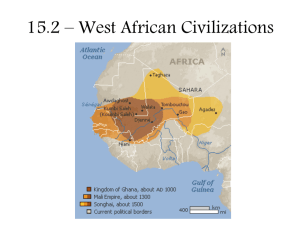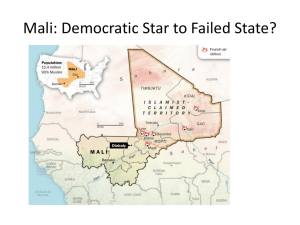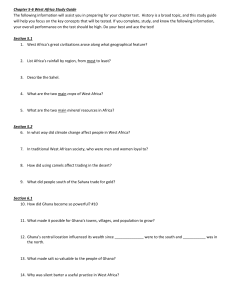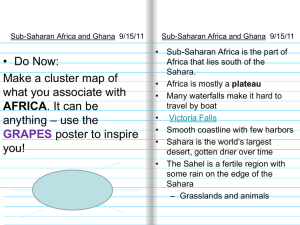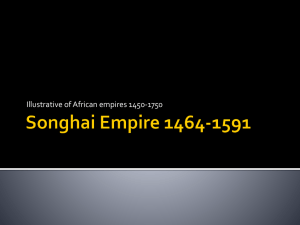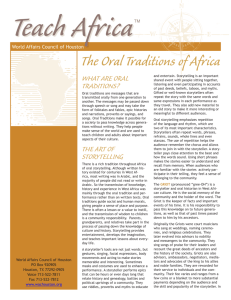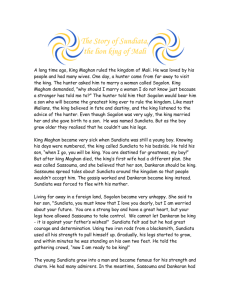Griot_oral_history - Mr. Grande`s World History
advertisement
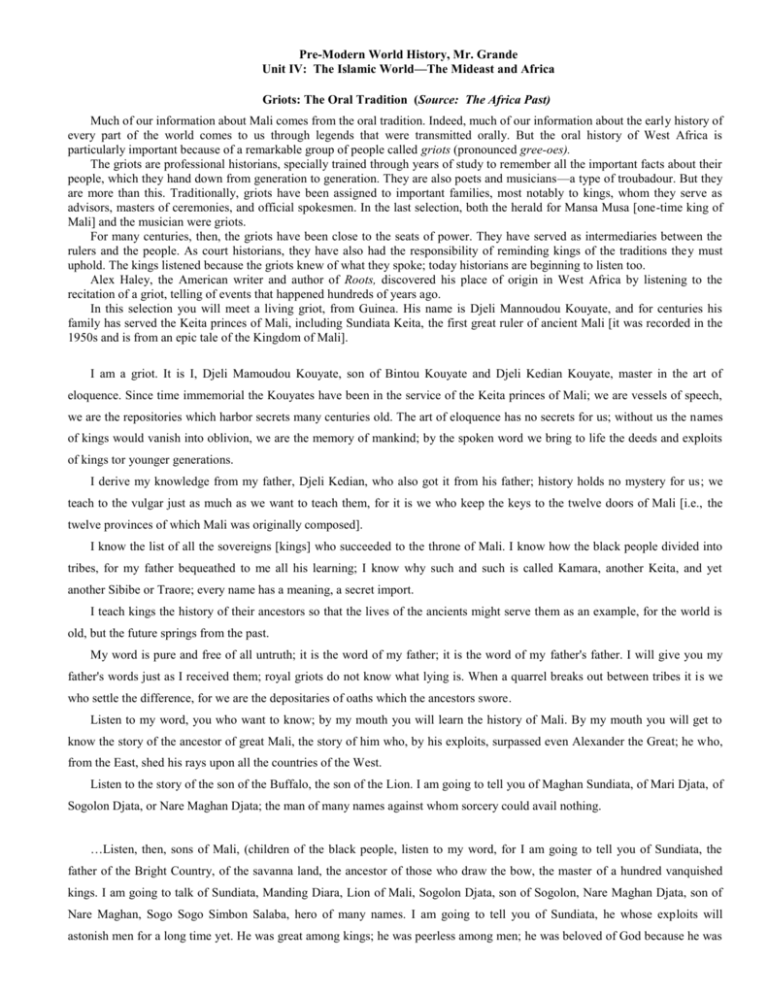
Pre-Modern World History, Mr. Grande Unit IV: The Islamic World—The Mideast and Africa Griots: The Oral Tradition (Source: The Africa Past) Much of our information about Mali comes from the oral tradition. Indeed, much of our information about the early history of every part of the world comes to us through legends that were transmitted orally. But the oral history of West Africa is particularly important because of a remarkable group of people called griots (pronounced gree-oes). The griots are professional historians, specially trained through years of study to remember all the important facts about their people, which they hand down from generation to generation. They are also poets and musicians—a type of troubadour. But they are more than this. Traditionally, griots have been assigned to important families, most notably to kings, whom they serve as advisors, masters of ceremonies, and official spokesmen. In the last selection, both the herald for Mansa Musa [one-time king of Mali] and the musician were griots. For many centuries, then, the griots have been close to the seats of power. They have served as intermediaries between the rulers and the people. As court historians, they have also had the responsibility of reminding kings of the traditions they must uphold. The kings listened because the griots knew of what they spoke; today historians are beginning to listen too. Alex Haley, the American writer and author of Roots, discovered his place of origin in West Africa by listening to the recitation of a griot, telling of events that happened hundreds of years ago. In this selection you will meet a living griot, from Guinea. His name is Djeli Mannoudou Kouyate, and for centuries his family has served the Keita princes of Mali, including Sundiata Keita, the first great ruler of ancient Mali [it was recorded in the 1950s and is from an epic tale of the Kingdom of Mali]. I am a griot. It is I, Djeli Mamoudou Kouyate, son of Bintou Kouyate and Djeli Kedian Kouyate, master in the art of eloquence. Since time immemorial the Kouyates have been in the service of the Keita princes of Mali; we are vessels of speech, we are the repositories which harbor secrets many centuries old. The art of eloquence has no secrets for us; without us the names of kings would vanish into oblivion, we are the memory of mankind; by the spoken word we bring to life the deeds and exploits of kings tor younger generations. I derive my knowledge from my father, Djeli Kedian, who also got it from his father; history holds no mystery for us; we teach to the vulgar just as much as we want to teach them, for it is we who keep the keys to the twelve doors of Mali [i.e., the twelve provinces of which Mali was originally composed]. I know the list of all the sovereigns [kings] who succeeded to the throne of Mali. I know how the black people divided into tribes, for my father bequeathed to me all his learning; I know why such and such is called Kamara, another Keita, and yet another Sibibe or Traore; every name has a meaning, a secret import. I teach kings the history of their ancestors so that the lives of the ancients might serve them as an example, for the world is old, but the future springs from the past. My word is pure and free of all untruth; it is the word of my father; it is the word of my father's father. I will give you my father's words just as I received them; royal griots do not know what lying is. When a quarrel breaks out between tribes it is we who settle the difference, for we are the depositaries of oaths which the ancestors swore. Listen to my word, you who want to know; by my mouth you will learn the history of Mali. By my mouth you will get to know the story of the ancestor of great Mali, the story of him who, by his exploits, surpassed even Alexander the Great; he who, from the East, shed his rays upon all the countries of the West. Listen to the story of the son of the Buffalo, the son of the Lion. I am going to tell you of Maghan Sundiata, of Mari Djata, of Sogolon Djata, or Nare Maghan Djata; the man of many names against whom sorcery could avail nothing. …Listen, then, sons of Mali, (children of the black people, listen to my word, for I am going to tell you of Sundiata, the father of the Bright Country, of the savanna land, the ancestor of those who draw the bow, the master of a hundred vanquished kings. I am going to talk of Sundiata, Manding Diara, Lion of Mali, Sogolon Djata, son of Sogolon, Nare Maghan Djata, son of Nare Maghan, Sogo Sogo Simbon Salaba, hero of many names. I am going to tell you of Sundiata, he whose exploits will astonish men for a long time yet. He was great among kings; he was peerless among men; he was beloved of God because he was the last of the great conquerors. Right at the beginning, then, Mali, was a province of the Bambara kings; those who are today called Mandingo, inhabitants of Mali, are not indigenous [local]; they come from the East. Bilali Bounama, ancestor of the Keitas, was the faithful servant of the prophet Muhammad (may the peace of God be upon him). Bilali Bounama had seven sons of whom the eldest, Lawalo, left the Holy City and came to settle in Mali; Lawalo had Latal Kalabi for a son, Latal Kalabi had Damul Kalabi, who then had Lahilatoul Kalabi. …To acquire my knowledge I have journeyed all round Mali. At Kita I saw the mountain where the lake of holy water sleeps; at Segou I learned the history of the kings of Do and Kri; at Fadama, in Hamana, I heard the Konde griots relate how the Keitas, Kondes, and Kamaras conquered Wouroula. At Keyla, the village of the great masters, I learned the origins of Mali and the art of speaking. Everywhere I was able to see and understand why my masters were teaching me, but between their hands I took an oath to teach only what is to be taught and to conceal what is to be kept concealed.


